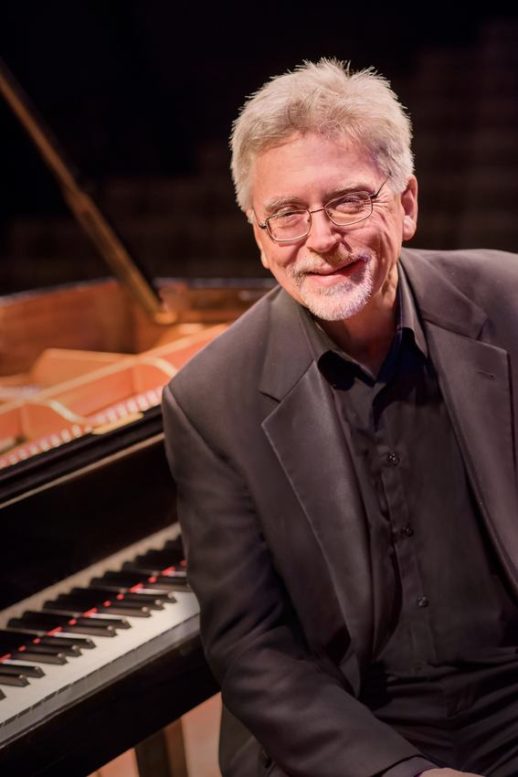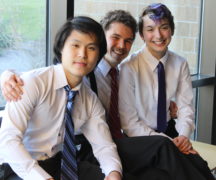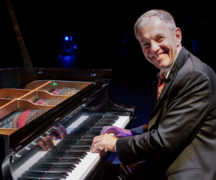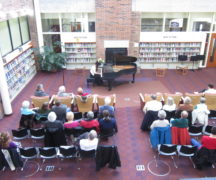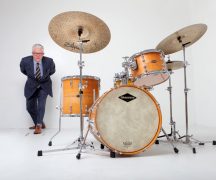By DAVID DUPONT
BG Independent News
Pianist Robert McDonald has two full-time teaching positions, one at the Juilliard School, and one at the Curtis Institute. He’s also in demand as a collaborative pianist and as a chamber musician. Given his schedule, the opportunities to present solo recitals have become fairly limited.
So McDonald is looking forward to taking the stage Saturday at 8 p.m. in Bryan Recital Hall to perform the music of J.S. Bach, Beethoven, Robert Schumann, and Claude Debussy.
McDonald is coming to Bowling Green State University as the guest artist for the David Dubois Piano Festival and Competition.
While here McDonald will give a master class for university pianists on Friday afternoon (2:30-4:30) and serve as one of the judges for the finals of the competition on Sunday morning, starting at 9.
The chance to perform a solo recital is one reason he’s anticipating his visit.
His visit was postponed from last year when the festival went virtual because of the pandemic.
Everything from the initial invitation through all the subsequent invitations “has been with great care,” he said. “It has kind of fired me up and certainly made me look forward to being part of it.”
The Dubois Festival is in its 12th year. Funded by the estate of music lover David D. Dubois it brings teenaged pianists from around the country to campus to compete. (See list of semifinalists below.) Those young pianists have often already won high level awards and performed with orchestras and on programs such as “From the Top” on NPR.
They are vying for cash awards of $3,000 for first, $2,000 for second, and $1,000 for third.
McDonald said in adjudicating a performance addressing the instrumental difficulties of a piece is basic. “You want to play the notes well that has to be there in a foundational way. … That, in a sense, is a given.” he said.
“What allows someone to stand out is their own artistic voice. How they give life to these notes. How well do they understand the intentions of the composer? “ The pianists need to understand the emotional demands of the piece. “That’s why we play music,” he said. “How well do you communicate to your listeners?”
On Saturday night, McDonald will present a program that he’s performed a few times before.
He’ll open with Bach’s French Suite, and then perform Beethoven’s sonata in E major, Op. 109. The second half will begin with the last of Schumann’s Novellette, and the performance will conclude with a set from Debussy’s First Book of Preludes.
“Almost accidentally there’s a larger effect,” McDonald said. “It may be subconscious on my part, why I selected them.”
Each half ends with “a serene and eloquent work,” one by Beethoven, the other by Debussy. “They are just examples of a deeper peacefulness in what it is they were reaching for.”
Early on McDonald knew he wanted to pursue music. But growing up in Iowa there was “nothing from my surroundings , other than parents who gave me whatever opportunities they could provide educationally,” he said. “I had access to some very good people when I was a youngster, but it often felt like it was in a vacuum.”
From the time he started lessons and learned to read music he felt a need to absorb as much music as he could. “It was not just playing the piano,” McDonald said. “I had a kind of deep-seated curiosity. I wanted to know all the music of a given composer.”
He went to the public library and absorbed all the classical albums in its collection. He read the liner notes and referred to the Schwann Catalog to find every recording of a specific pieces.
“This was driven by love for what I was discovering,” he remembers.
But there was no one who shared the same intense focus on music. “I kept to myself. I was very devoted to practicing.”
When it came time to go to college, he selected Lawrence University, a liberal arts school with a strong music program. Until then he had no role models for pursuing a musical career.
At Lawrence, his piano teacher recognized his gift and passion and told him after his second year that he needed to go somewhere else to pursue them.
Instead of completing his senior year at Lawrence, he went to Curtis. He was almost too old to be accepted, he said.
Lawrence, he said, “finessed” awarding him a degree, for which he was grateful. “The Lawrence experience set me on the right path.”
He had a solo career playing concerts in Europe. He won a few competitions. Given his late start he was constantly bumping up against age limits.
As a National Federation of Music Clubs award winner, he also performed throughout the United States.
He credited his attendance at the Marlboro Music Festival in Vermont with helping to establish him as a chamber player. “I found I was comfortable doing that.”
At that time, though, “there was a lot of suspicion you couldn’t do both” solo and ensemble work.
One manager took an interest in him, but told him he’d have to stop working as an accompanist and chamber player.
“I knew in my heart that didn’t make a lot of sense to me financially,” he said. “I’d have plenty of work if I kept circulating the way I did. I was a little bit passive. I hadn’t been groomed at an early age to be a soloist. I would have had to work harder at it, and I had to earn a living. It sounds like I took the lesser road, but no means do I feel that. I took the road that was right for me.”
He tells his students that as professionals they do the best they can to cover all the bases. “Being a good chamber musician greatly informs the way you think about your solo literature.”
He asks students contemplating whether to pursue music as a career if the first thing they do when they get up is feel the need to go to the instrument. “You know inside that this is what you have to do to make yourself feel complete as a human being,” McDonald said. “If that’s the case, they don’t have a choice.”
There will be many hurdles. They will have doubts about themselves and their abilities.
“There’s plenty of room for that. But at the end of the day if the need to do it is the most powerful thing, then that’s the answer.”
***
2022 Dubois Semifinalists:
Sophia Kim, Wayne, New Jersey
Ella Dorsey, San Diego, California (Interlochen Arts Academy, Interlochen, Michigan)
Weillison Hsu, Houston, Texas
Munan Cheng, San Jose, California
Benedict Cicilio, Cincinnati
Madison Sheffield, Youngstown
Noah Kim, Vernon Hills, Illinois
Luca Albano, Rochester, New York
Keliang Yao, Lebanon
Yuka Yang, Germantown, Tennessee
Patrick Flythe, Westerville
Yimei Liang, Beijing, China (Interlochen Arts Academy)
Cory Wu, Powell
Kejia Wei, Westlake
Jean Yu, Rochester Hills, Michigan
Mark DeFalco Chargory, Lake Charles, Louisiana (Interlochen Arts Academy)
Khoa Ho, Ho Chi Minh City, Vietnam (Interlochen Arts Academy)
Sophia Lin, Falls Church, Virginia

